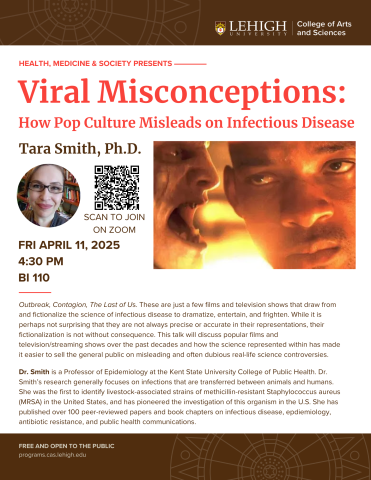Outbreak, Contagion, The Last of Us. These are just a few films and television shows that draw from and fictionalize the science of infectious disease to dramatize, entertain, and frighten. While it is perhaps not surprising that they are not always precise or accurate in their representations, their fictionalization is not without consequence. This talk will discuss popular films and television/streaming shows over the past decades and how the science represented within has made it easier to sell the general public on misleading and often dubious real-life science controversies.
Dr. Smith is a Professor of Epidemiology at the Kent State University College of Public Health. Dr. Smith’s research generally focuses on infections that are transferred between animals and humans. She was the first to identify livestock-associated strains of methicillin-resistant Staphylococcus aureus (MRSA) in the United States, and has pioneered the investigation of this organism in the U.S. She has published over 100 peer-reviewed papers and book chapters on infectious disease, epidemiology, antibiotic resistance, and public health communications and given talks at numerous national and international platforms, including talks on Capitol Hill. Dr. Smith is also very active in science communication and outreach. Her work has been profiled in many major publications, including Science, Nature, and The New York Times. She has maintained a science blog for 11 years and has written books on Group A Streptococcus, Group B Streptococcus, and Ebola. A second book on Ebola published by MIT Press, Ebola's Message: Public Health and Medicine in the Twenty-First Century, was published in 2016. She also writes about infectious disease and science communication for Slate, MentalFloss, and pens a column for SELF.com.

